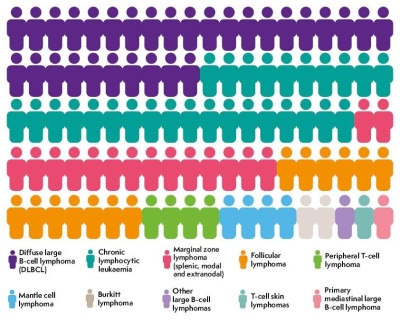
Lymphoma Action; taken from web page correct as of April 2022
Overall, lymphoma is the fifth most common cancer in the UK.
As there are so many types of lymphoma, some types are rare. This graphic from Lymphoma Action shows how common various types of lymphoma are.
About high-grade non-Hodgkin lymphoma
Lymphoma cancer cells can grow at very different rates.
Some types of non-Hodgkin lymphoma are called ‘high grade’ when the lymphoma cells are dividing quickly. Although this sounds alarming, high-grade non-Hodgkin lymphoma usually responds very well to treatment and most types are unlikely to come back after successful treatment.
There are several different types of high-grade non-Hodgkin lymphoma, and they can develop from B cells or T cells.
B cells and T cells are the two main types of lymphocytes – white blood cells that help us fight infections.
Some of the more common high-grade B-cell lymphomas include:
- Diffuse large B-cell lymphoma (DLBCL)
- Primary mediastinal large B-cell lymphoma (PMBL)
- Burkitt’s lymphoma
- Primary central nervous system (CNS) lymphoma
High-grade T-cell non-Hodgkin lymphomas are less common – around 1 in 10 lymphomas develop from T cells. The most common types include:
- Anaplastic large cell lymphoma (ALCL)
- Angioimmunoblastic T-cell lymphoma (AITL)
- Peripheral T-cell lymphoma not otherwise specified (PTCL-NOS)
This sub-type often respond well to treatment. Many people achieve ‘complete remission’ – that means there is no evidence of lymphoma on scans or other tests. A high percentage of these people are cured – that means the lymphoma never comes back (recurs).
Treatment of high-grade non-Hodgkin lymphoma at The Clatterbridge Cancer Centre
Treatment depends on a range of factors including the type, size, stage and location of your tumour. It may also depend on your age, general health and genetic factors (linked to the DNA changes in your cells) that tell us how your cancer developed.
When you are diagnosed, your care will be discussed at a multidisciplinary team meeting (MDT) where different specialists will consider the best treatment options for you. Your doctor will discuss this with you so you can decide what is right for you.
We provide a range of specialist treatments for high-grade lymphomas, including:
- Chemotherapy
- Radiotherapy
- Targeted treatments and antibody therapy
- Steroids
- Stem cell transplants
- CAR-T cell therapy
- Bispecifc antibodies
- Clinical trials
- Supportive treatments (such as blood transfusions)
- Treatment to control symptoms (palliative care)
Find out more at The Clatterbridge Cancer Centre about:
Our Cancer Information and Support Centres can provide individualised help and support for patients and families affected by cancer. The team’s main base is in Clatterbridge Cancer Centre – Liverpool but they also work at our Aintree and Wirral hospitals.
There are also local Macmillan services in other hospitals across our region.
External sites that offer extra support and information about different types of high grade lymphoma include: